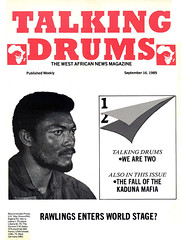Comment
Friends And Markets
The recent change of guard in Nigeria is supposed to have made the trip less difficult for Mr Howe. The new leaders are talking about human rights and have released political prisoners and repealed Decree No 4, all of which were subjects that would have proved very tricky for Mr Howe to handle.
However, Gen. Babangida ought not to forget that if the events of August 27 had not occurred, Mr Howe would have still made the journey and would have fashioned his speech in such a way as to accommodate the circumstances he would have met.
His overriding concern would be to make sure that "Britain's largest market in Africa" remains open to Britain. To attain this objective, everything is negotiable. Luckily for Mr Howe, the obvious symbols of repression had been removed before his visit, it is doubtful that he has had to change much of his speech in the light of recent events. He would probably have met Messrs Buhari and Idiagbon and come away from Nigeria "much impressed with the brave steps being taken by the government to solve the many problems facing the country".
It becomes a little confusing when in the pursuit of markets. Her Majesty's Government appears willing to sup with any devil because some people in the former colonies were still under the impression that "British standards" remained something the rest of the world ought to aspire to.
What is one to make out of a state of affairs in which Alhaji Shehu Shagari is treated as an honoured guest in the United Kingdom and a few weeks later he is publicly condemned as a thief and a crook and those who so denounce him become the new set of honoured guests? Not everybody agrees, but some people insist that politics are a dirty game, and it might therefore be understandable if all these unsavoury leaders were entertained at No. 10 Downing Street or at Chequers, since these are official residences. In that case, the Queen might be left out of having to play hostess to leaders who will be condemned as thieves and crooks the next day. It leaves a sour taste to imagine that the Queen had been having under her roof and at her table people who should not be entertained in decent society.
It might be argued that the fault does not lie with Britain, that African countries are unstable and have a habit of turning on their leaders with alarming regularity. But Britain surely has a responsibility to be more discerning in the people that she associates with and, if in the pursuit of markets, she is ready to compromise her principle, then the penalty will have to be paid with constant embarrassing situations.
Maj-Gen. Babangida would not have lost sight of the fact that Mr Howe had flown to Nigeria straight from Brussels where Britain had been the only country among the EEC nations to block a motion for the imposition of sanctions on South Africa. Nor will Gen. Babangida forget that the last time Nigeria did something specific to penalise British interest for breaking the oil embargo on Rhodesia, the results were immediate and positive.
It might very well be that when the crunch is on, the bigger market will win, and at the moment, South Africa seems to Britain to present the bigger market. It is to be hoped sincerely that such very short term considerations will not influence British thinking, because not only will South Africa be eventually freed, it is not worth sacrificing the rest of Africa for the sake of the odd five million or so whites in Southern Africa.
The work of Mr Howe and others in his position would be eminently simpler if the age-old "British standards" that were preached around the world were maintained and everybody was left under no illusion whatsoever about the considerations that guide the conduct of foreign relations in Her Majesty's realm.
We Are Two Years Old
We can hardly believe it but we are two years old. It might not sound much, but to us it has been two years of hard, painful, sometimes rewarding labour.We are nowhere near achieving the objectives we set ourselves two years ago, and it might very well be that our only significant achievement has been our survival (with a few hiccups).
Ours has been a baptism of fire in the marketplace, but we take consolation in the fact that increasingly we have been proved right on many issues.
We still extend our invitation to all who are interested in West African affairs to discuss and debate them in our columns. We have surprised ourselves by making it thus far, with your help we shall make it even further.
